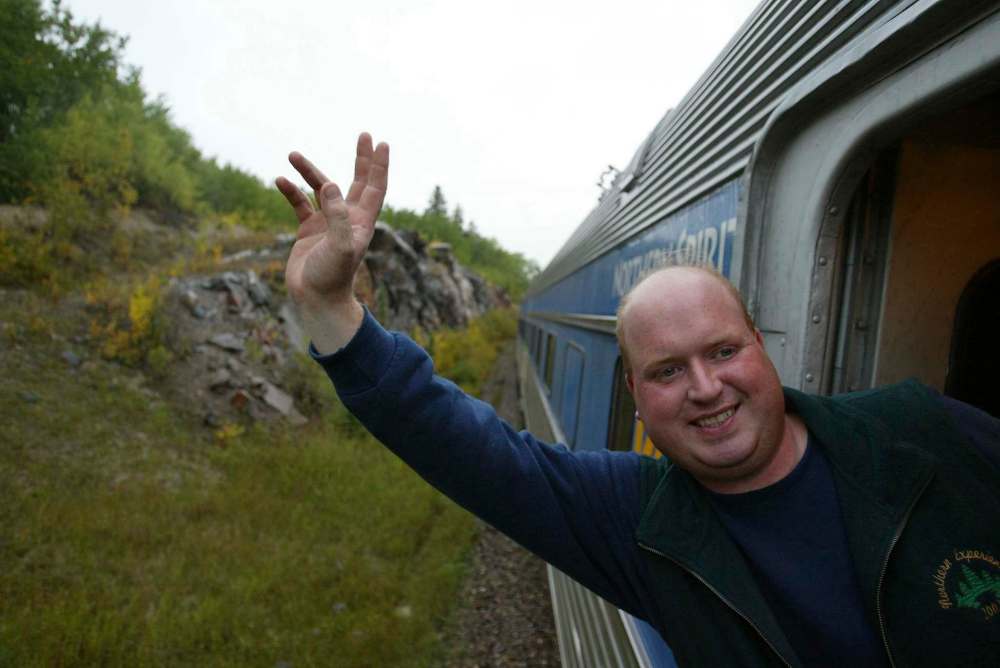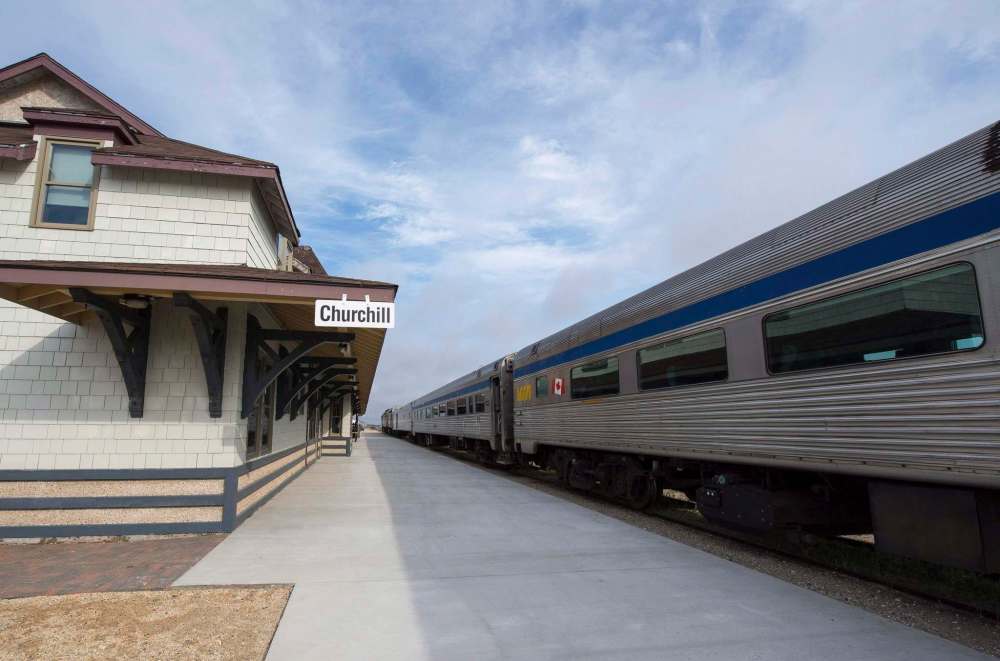Never the train shall meet
As anniversary of losing rail line looms, Churchill still not giving up
Advertisement
Read this article for free:
or
Already have an account? Log in here »
To continue reading, please subscribe:
Monthly Digital Subscription
$1 per week for 24 weeks*
- Enjoy unlimited reading on winnipegfreepress.com
- Read the E-Edition, our digital replica newspaper
- Access News Break, our award-winning app
- Play interactive puzzles
*Billed as $4.00 plus GST every four weeks. After 24 weeks, price increases to the regular rate of $19.95 plus GST every four weeks. Offer available to new and qualified returning subscribers only. Cancel any time.
Monthly Digital Subscription
$4.99/week*
- Enjoy unlimited reading on winnipegfreepress.com
- Read the E-Edition, our digital replica newspaper
- Access News Break, our award-winning app
- Play interactive puzzles
*Billed as $19.95 plus GST every four weeks. Cancel any time.
To continue reading, please subscribe:
Add Free Press access to your Brandon Sun subscription for only an additional
$1 for the first 4 weeks*
*Your next subscription payment will increase by $1.00 and you will be charged $16.99 plus GST for four weeks. After four weeks, your payment will increase to $23.99 plus GST every four weeks.
Read unlimited articles for free today:
or
Already have an account? Log in here »
Hey there, time traveller!
This article was published 22/05/2018 (2811 days ago), so information in it may no longer be current.
OTTAWA — A year ago, the Home Hardware store in Churchill was where locals started their household projects. It has since lost 80 per cent of its business, according to co-owner Dale de Meulles.
“At this point, maybe people will buy up all the plywood, to board up the homes and businesses,” he said. “Everybody’s hurting. I’m just glad I don’t have three kids to feed.”
Wednesday will mark a year since a catastrophic washout near Gillam cut off the Hudson Bay Railway, severing Churchill’s lifeline to the south. As May 23 looms, residents are clinging to hope for a return to normalcy, but they’re beat down by sky-high food prices, families moving south and constant promises of a solution on the horizon.
“A lot of people are still very depressed; they’re not doing that great. A lot of people are still hungry,” said Dale’s wife Rhoda. “We’re waiting for hope.”
The province has put faith in the line being repaired soon. Around February, Travel Manitoba ran a national TV commercial that highlighted the train to Churchill, which it said was a deliberate choice.

In Winnipeg, Daryl Adair, owner of Rail Travel Tours, still gets regular calls from people hoping to book tickets this year. They wonder whether the railway will be operating by this fall’s beluga season. “What do I tell them? We just don’t know,” said Adair.
Now that he has more free time, he keeps abreast of the federal lawsuit, regulatory probe and Ottawa’s ongoing talks aimed at transferring the railway into local hands.
He parses media coverage, politicians’ statements and even court schedules. And he’s not impressed.
“The lack of organization by all governments involved is frustrating. The fact it’s a year shows how poorly the governments are handling it, and it’s not being prioritized,” Adair said.
Adairs says that people who left deposits with him last year are increasingly asking for refunds.
Churchill Mayor Mike Spence says there’s been decent progress in Ottawa’s negotiations surrounding the railway and port, which it aims to transfer from Denver-based Omnitrax to a local consortium he is co-leading. They’ve ironed out a business plan, and are finally reaching out to Omnitrax about a possible deal.
“I’m optimistic it’s going to be done; it’s just taking longer than we anticipated, or expected, for that matter,” Spence said.

But it’s too late for Jay Michno, who disbanded his Winnipeg business Arctic Expediting in December.
The company used to ship everything from vehicles to chemical compounds from Winnipeg up the railway to Churchill, where barges took it onwards to the 10,000 residents of western Nunavut’s Kivalliq region.
“There’s no question business has left Manitoba,” he said. “It’s generally smaller businesses that are being effected.”

He said Winnipeg businesses who fly up smaller goods are still in business, but that Nunavut companies are now opting for cheaper prices from Montreal — whose port seems a lot more reliable. “There’s been a lot of trust broken for people in the Kivalliq,” said Michno.
He’s now pursuing a business degree, and hopes to help re-establish Winnipeg’s connection with the north. “But we just couldn’t wait forever. This has just been going on for so long already, and there seems to be no end in sight.”
On Wednesday, Churchill residents will hold a rally outside the local train station, to air their frustrations, and look back on what they’ve endured. They’ll head to the local theatre for a documentary screening about how the town of 900 has fared.
The local school’s enrolment now sits at 170, down from 220 a year ago.
Even with subsidies, a four-litre jug of milk costs $10.89 at the local grocery store, while a four-pack of tomatoes is priced at $10.59.
Residents started buying packaged food online.
Earlier this month, an arts and culture group had the comedian Big Daddy Tazz fly up for a performance dubbed “Off The Rails,” to bring some levity to the town’s woes and take potshots at how both Omnitrax and governments have handled the situation.

That same weekend, the town’s only bakery burned to the ground, cutting off a major gathering point that employed locals who helped feed the town and bake bread flown up to Nunavut. Now the town is relying on packaged bread from down south.
Rhoda said the town has been buoyed by donations, and by the pressure other Manitobans have put on politicians. But she says online comments asking why the town won’t relocate south have cut deeply.
“This is my living; of course I’m going to stay here. Where am I gonna go? I can’t sell; nobody’s going to buy,” she said, her voice rising. She pauses.
“You have to do one day at a time here; that’s all you can do.”
At Churchill’s town complex, Claudia Grill helps keep a bulletin board with 30 job postings. From health care to trades and administration, employers are looking for jobs, but they often need to look down south.
Raised in the Austrian Alps, Grill came up to Churchill for an 18-month research term in 2010, but fell in love with the town’s frontier mentality and open expanses.
“Churchill got me hooked, so I decided to come back,” she said. “Here it’s just open in its mentality, and anything’s possible.”
A month ago, the town hired her as part of the Training to Employment project, an umbrella group that tries to get locals qualified for jobs already available in town, and for industries likely to grow.

“I’m trying to build a foundation here for future sustainability and independence,” said Grill, who co-ordinates with multiple agenices.
“That’s my role; to give confidence in the future — that if you work on it, then we can change something and take charge of it.”
Spence hopes Ottawa and the province take a similar viewpoint. He questions the snowballing costs both levels of government have borne through food subsidies, fuel shipments and bureaucrats’ work hours. “We can’t allow this to continue to drag on, indefinitely.”
He said getting the railway fixed would be the first step in an economic strategy focused on climate-change research, health care for the north and even more tourism.
“People in this community have not given up. Our community is very resilient, and we will get though this.”
dylan.robertson@freepress.mb.ca



